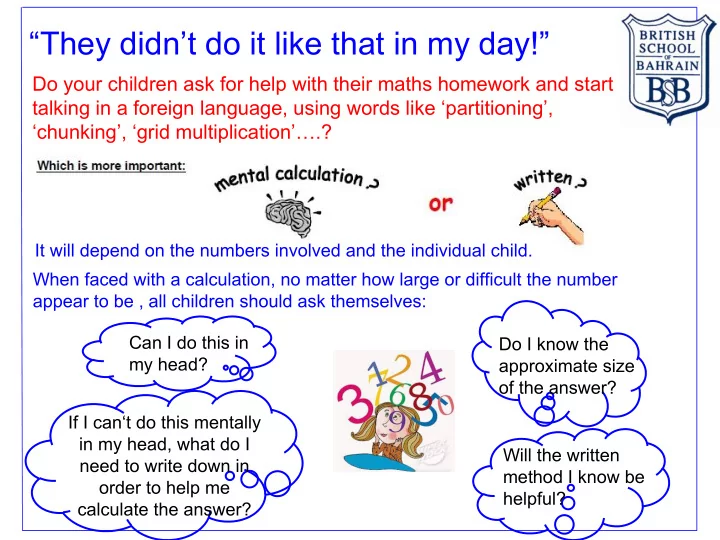

“They didn’t do it like that in my day!” Do your children ask for help with their maths homework and start talking in a foreign language, using words like ‘partitioning’, ‘chunking’, ‘grid multiplication’….? It will depend on the numbers involved and the individual child. When faced with a calculation, no matter how large or difficult the number appear to be , all children should ask themselves: Can I do this in Do I know the my head? approximate size of the answer? If I can‘t do this mentally in my head, what do I Will the written need to write down in method I know be order to help me helpful? calculate the answer?
Empowering parents to support their children in Maths The British School of Bahrain Presented by Martin Drennan & Stephen Greene
Aims ❖ To discuss the importance of positive attitudes towards Mathematics and the impact it plays on a child’s understanding of Mathematics. ❖ To share types of recording that your child will be introduced to, to support their written calculation methods when problem solving. ❖ To show you some possible activities and resources that you may be able to make/use to support your child/children at home.
How do you feel about Mathematics? ‘I love Maths!’ or ‘I can’t do Maths!’ What are your experiences of Mathematics at school? How have they affected your attitude towards the subject? Do you have a positive attitude?
Children learn in different ways Each child is an individual and all children develop their mathematical understanding at a different pace. Visual – learns best by seeing Audio – learns best by hearing Kinaesthetic- learns best by feeling or experiencing There is no right or wrong way. We facilitate the skills, equipping the children with the strategies to help themselves.
Problem Solving Questions Children regularly have to make decisions about what mathematics to use when solving problems. Children use jottings to solve problems. Jottings are understood as an; ❖ Opportunity to take risks ❖ Explore different solutions ❖ Make mistakes ❖ Try something else RUCSAC Method - Click Here
Problem Solving Strategies How did you answer • Act it out the question? • Make a model • Work backwards Which method did you • Guess, check and improve use? • Solve a simpler, related problem • Look for a pattern Why did you use that • Try all possibilities method? • Seek an exception • Break it into more manageable Would you be able to parts explain how you solved • Draw a picture or a graph the problem? • Make a list or table • Have I seen a similar problem? How did you feel about • Use a sum or number sentence solving the problem? Did you check your answer?
Real Life Maths Mental Addition and Subtraction at the mall. Who can estimate closest to the real total? Calculate cost of family holidays: (Flights + Hotel + Spending Money) x Number of people in your family. Work out the total price per person. Plan a trip for family member to come to Bahrain For football lovers, talk about the transfer fees. Eg Manchester United bought Paul Pogba for 89 million pounds. If he plays for 5 years, how much will that work out at per year/month/week/day? -
Key Messages ❖ Children are taught to use mental methods as a first resort when faced with a calculation. ❖ Informal written methods are developed from mental methods. ❖ Formal written methods are developed from informal written methods. ❖ Teachers continue to develop children’s mental methods and informal written methods even when formal written methods are established. ❖ Through demonstration, visual models and images are used together with practical hands on resources to support mathematical learning at all age ranges.
How can you continue to support your child? Meaningful real life contexts are used to engage children in learning in mathematics . ❖ It is most important that you talk & listen to your child about their work in maths. It will help your child if they have to explain to you. ❖ Share the maths activity with your child and discuss it with them. ❖ Be positive about maths, even if you don’t feel confident about it yourself. ❖ Remember, you are not expected to teach your child maths, but please share, talk and listen to your child. ❖ If your child cannot do their homework do let the teacher know by either writing a note in your child’s book or telling the teacher. ❖ A lot of maths can be done using everyday situations and will not need pencil and paper methods. ❖ Play games and have fun with maths!
Recommend
More recommend